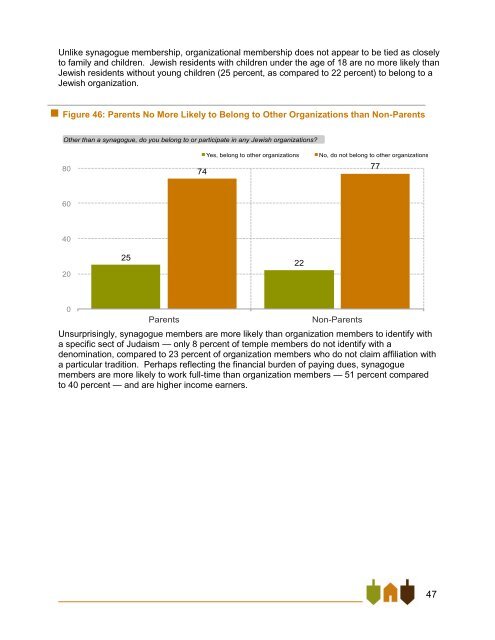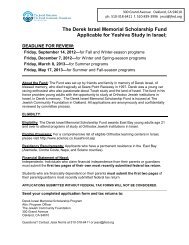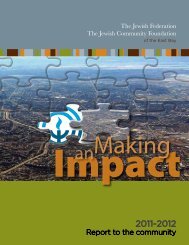East Bay Jewish Community Study - Jewish Federation of the ...
East Bay Jewish Community Study - Jewish Federation of the ...
East Bay Jewish Community Study - Jewish Federation of the ...
You also want an ePaper? Increase the reach of your titles
YUMPU automatically turns print PDFs into web optimized ePapers that Google loves.
Unlike synagogue membership, organizational membership does not appear to be tied as closely<br />
to family and children. <strong>Jewish</strong> residents with children under <strong>the</strong> age <strong>of</strong> 18 are no more likely than<br />
<strong>Jewish</strong> residents without young children (25 percent, as compared to 22 percent) to belong to a<br />
<strong>Jewish</strong> organization.<br />
Figure 46: Parents No More Likely to Belong to O<strong>the</strong>r Organizations than Non-Parents<br />
O<strong>the</strong>r than a synagogue, do you belong to or participate in any <strong>Jewish</strong> organizations<br />
80<br />
74<br />
Yes, belong to o<strong>the</strong>r organizations<br />
No, do not belong to o<strong>the</strong>r organizations<br />
77<br />
60<br />
40<br />
20<br />
25<br />
22<br />
0<br />
Parents<br />
Non-Parents<br />
Unsurprisingly, synagogue members are more likely than organization members to identify with<br />
a specific sect <strong>of</strong> Judaism — only 8 percent <strong>of</strong> temple members do not identify with a<br />
denomination, compared to 23 percent <strong>of</strong> organization members who do not claim affiliation with<br />
a particular tradition. Perhaps reflecting <strong>the</strong> financial burden <strong>of</strong> paying dues, synagogue<br />
members are more likely to work full-time than organization members — 51 percent compared<br />
to 40 percent — and are higher income earners.<br />
47




